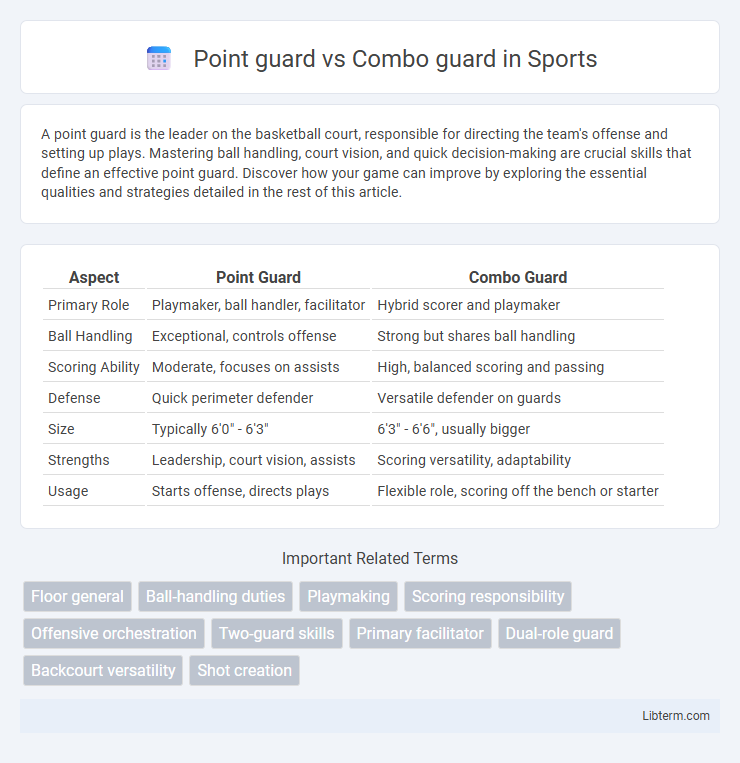A point guard is the leader on the basketball court, responsible for directing the team's offense and setting up plays. Mastering ball handling, court vision, and quick decision-making are crucial skills that define an effective point guard. Discover how your game can improve by exploring the essential qualities and strategies detailed in the rest of this article.
Table of Comparison
| Aspect | Point Guard | Combo Guard |
|---|---|---|
| Primary Role | Playmaker, ball handler, facilitator | Hybrid scorer and playmaker |
| Ball Handling | Exceptional, controls offense | Strong but shares ball handling |
| Scoring Ability | Moderate, focuses on assists | High, balanced scoring and passing |
| Defense | Quick perimeter defender | Versatile defender on guards |
| Size | Typically 6'0" - 6'3" | 6'3" - 6'6", usually bigger |
| Strengths | Leadership, court vision, assists | Scoring versatility, adaptability |
| Usage | Starts offense, directs plays | Flexible role, scoring off the bench or starter |
Introduction to Guard Positions in Basketball
Point guards primarily facilitate team offense, directing plays and distributing the ball with excellent court vision and passing skills. Combo guards blend the roles of point guards and shooting guards, combining playmaking abilities with scoring versatility to adapt to multiple offensive needs. Both positions require strong ball-handling and decision-making, but combo guards often provide more scoring options while point guards emphasize orchestration and control of the game's tempo.
Defining the Point Guard Role
The point guard serves as the primary playmaker, responsible for orchestrating the team's offense through precise ball handling, court vision, and decision-making. Often referred to as the "floor general," this role requires the ability to set up teammates, control the tempo, and execute offensive strategies effectively. Unlike combo guards who blend shooting and playmaking, the point guard's defining characteristic is their emphasis on facilitating and directing team dynamics.
Understanding the Combo Guard
A combo guard blends the playmaking skills of a point guard with the scoring ability of a shooting guard, offering versatility on offense and defense. Unlike a traditional point guard who primarily facilitates ball distribution and controls game tempo, a combo guard adapts to multiple roles, often creating mismatches against defenders. Their ability to score from perimeter shots and drive to the basket while orchestrating plays makes them valuable assets in modern basketball lineups.
Key Skills of a Point Guard
A point guard excels in ball handling, court vision, and playmaking, orchestrating the offense by setting up teammates and controlling the game's tempo. Mastery in passing accuracy, quick decision-making, and leadership on the floor distinguishes a point guard from a combo guard, who blends point guard and shooting guard responsibilities. Defensive agility and the ability to manage pressure situations further define the essential skills required for an elite point guard.
Core Attributes of a Combo Guard
A combo guard combines the core attributes of both a point guard and a shooting guard, offering versatility in ball-handling, playmaking, and scoring. Key traits include strong dribbling skills, the ability to create plays for teammates, and efficient perimeter shooting, especially from beyond the arc. This hybrid role demands agility, court awareness, and scoring adaptability to switch between facilitating offense and taking on primary scoring responsibilities.
Playmaking vs. Scoring: Guard Role Comparison
Point guards typically excel in playmaking, orchestrating the offense with precise passing and court vision to set up teammates for scoring opportunities. Combo guards blend playmaking with scoring prowess, possessing the ability to create their own shot while still facilitating ball movement. The choice between a pure point guard and a combo guard often depends on a team's emphasis on structured offense versus dynamic scoring threats from the backcourt.
Defensive Responsibilities: Point Guard vs Combo Guard
Point guards primarily focus on defending opposing point guards, utilizing quickness and agility to disrupt ball handlers and prevent penetration. Combo guards possess versatility to guard multiple backcourt positions, often taking on both point guards and shooting guards due to their blend of size and speed. Defensive responsibilities for combo guards require adapting to varied offensive threats, including perimeter shooters and ball handlers, demanding both lateral quickness and physicality.
Famous NBA Point Guards and Combo Guards
Famous NBA point guards like Stephen Curry and Chris Paul excel in playmaking and controlling the game's tempo, showcasing elite passing and court vision. Combo guards such as James Harden and Luka Doncic blend point guard skills with shooting and scoring ability, providing versatile offensive threats. This hybrid role allows combo guards to adapt between facilitating teammates and creating their own shots, making them invaluable in modern basketball strategies.
Team Strategies: Choosing the Right Guard
Selecting a point guard or combo guard significantly influences team strategies, as point guards primarily excel in playmaking and orchestrating offenses, while combo guards offer versatility with scoring and ball-handling capabilities. Teams emphasizing ball distribution and structured offense often opt for traditional point guards to maintain control and facilitate teammates. Conversely, squads seeking dynamic scoring threats and adaptability in guard roles favor combo guards to exploit mismatches and enhance offensive unpredictability.
Point Guard or Combo Guard: Which Fits Your Game?
Point guards excel in playmaking, court vision, and orchestrating the offense, making them ideal for teams prioritizing ball distribution and tempo control. Combo guards blend the skills of point guards and shooting guards, offering scoring versatility and defensive flexibility, suitable for players who can handle the ball but also want to create their own shot. Choosing between a point guard and a combo guard depends on your strengths in ball handling, scoring ability, and the specific needs of your team's gameplay.
Point guard Infographic

 libterm.com
libterm.com